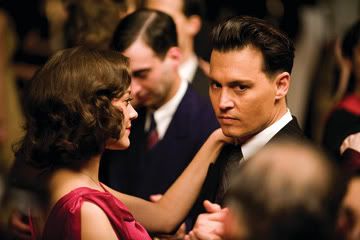

John Dillinger did one thing, and he did it well. He robbed banks. And for a long while, he got away with it. In 1933 when the Great Depression was booming, so was Dillinger's wave of crime and robbery. The one thing director Michael Mann ("Collateral," "Miami Vice") does with "Public Enemies" is keep it from cliché. As Dillinger, Johnny Depp could've played him as the famed outlaw, a vigilante hero that soaks up the glory of his own legend with an epic retelling of his story, but he doesn't. He doesn't play it like that because Mann doesn't allow it. Rather than creating an entire history and making the story bigger than it is, Mann settles into a great American story and simply tells it like it is. There are no Hollywood frills, no larger statement at hand, no bigger meaning, and like Dillinger's own demise, it just comes at you all of a sudden.
Depp gives many shadings to the character of Dillinger. As a master of social interaction and pleasing others, he is impossible to capture and has an easy time capturing the admiration of those who aren't chasing after him. He's charismatic and sly but also holds darkness within, an unsatiated desire for something that isn't even appeased by the thrill of robberies. And yet this longing is what further accelerates and prolongs his criminal career. Depp does an outstanding job in presenting us this multifaceted man even in the opening sequence as he breaks out of a prison after just one day of being locked up. One night while dining out, Dillinger eyes a gorgeous woman from afar, Billie Frechette ("La Vie en Rose" Oscar-winner Marion Cotillard), who he immediately takes as his own to cherish and protect. Had that been for what he was longing? He projects a startling seriousness to her in stating that she essentially has no choice in being with him. She dutifully complies, and they become lovers. The movie isn't so much interested in their love than it is in their unique connection to one another. He wants to protect her out of the obligation that her being with him puts her at great risk, and that's it. She becomes satisfied in coming along for his ride.
The movie is based off the book "Public Enemies: America's Greatest Crime Wave and the Birth of the FBI, 1933-1934" by Bryan Burrough, and Mann's research and attention to detail from the source material is impeccable. He made sure Depp looked like Dillinger and even had his speaking style, both of which he pulled off marvelously. Mann shot on location for many of the scenes, including the film's final moment at the Biograph Theater. This is the film's one poetic moment where, on the last night of his life, Dillinger watched Clark Gable in "Manhattan Melodrama." The man Gable plays is just like Dillinger, both who evaded the law for so long but didn't learn much. The law was waiting right aside for Dillinger after the movie. An astonishing moment, really, considering all that had happened previous. One sequence involves Dillinger strolling right into the Dillinger Bureau of the Chicago Police Department without anyone noticing who he was. He was literally untouchable.
Throughout the movie, Dillinger is pursued by Melvin Purvis. He is played by Christian Bale, whose performance is just as straightforward as Depp's. He is cold and angry, and all he cares about is ending crime and catching Dillinger. The film's most exciting moment comes when Purvis and his FBI team raid Dillinger at his hideout at Little Bohemia Lodge in Wisconsin. It's a thrilling, forested shootout that is realistic and gritty like the rest of the film. There is a subdued sense of style that Mann upholds throughout even in the tommy-gun action, and it shows not only in the cinematography but also in the screenplay.
In taking "Public Enemies" as a whole, the sum of its parts never really end up offering anything more than a sincere look at the final year in the life of John Dillinger. That's all there is to it, which could take some audiences aback. It's good but not great as it's curiously devoid of something more aside from that stunning performance from Depp who only seems to be getting better and better. And pay attention to Cotillard on his side, especially during the scene where the FBI interrogator beats her up. She has the emotional potency of a true rising star.





No comments:
Post a Comment